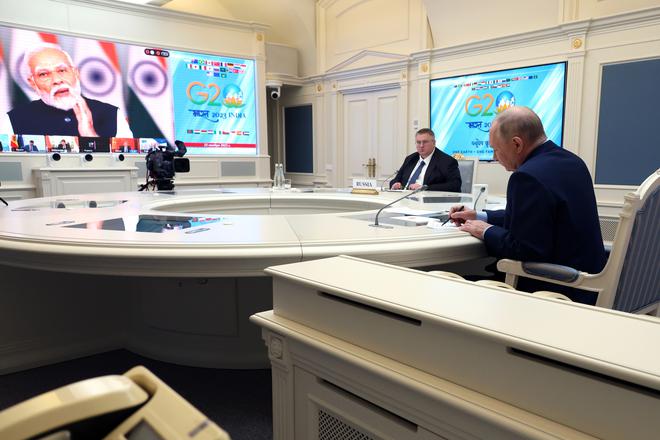Prime Minister Narendra Modi on Wednesday asserted that there is zero tolerance for terrorism and that the killings of innocents, especially children and women, are not acceptable.
Mr. Modi made these comments in his concluding remarks at the virtual G-20 summit in the context of the Israel-Hamas conflict and noted that he believed, after hearing the views of other leaders, that there was an agreement on several points, including this.
Listing the points on which there was agreement in the G-20, Mr. Modi also said the two-state solution was necessary for permanently addressing the Israel-Palestine issue. He added that diplomacy and dialogue were the only way forward to defuse such a territorial and political crisis.
"We all condemn terrorism and violence," he said, calling for the restoration of regional peace and stability in West Asia.
Virtually addressing the G-20 meeting hosted by India, Russian President Vladimir Putin said in Moscow that what was happening in Ukraine was undoubtedly a “tragedy” and that conflicts elsewhere, including in the Gaza Strip, were also “shocking”.
In an apparent reference to the humanitarian crisis in Gaza, Prime Minister Modi said human assistance should reach them quickly and safely. He welcomed the news about the release of Israeli hostages.
The G-20 was ready to give all possible help, he said, expressing confidence that the global body would work unitedly with the spirit of "vasudhaiva kutumbakam" for global peace, stability and prosperity.
"It will continue to work to meet the expectations of the Global South," Mr. Modi said, expressing hope that the G-20 would move forward on the issue of reforming multilateral development banks and global governance.
Transparent steps would be taken for debt restructuring, he said, in his reference to the G-20's likely agenda under Brazil's presidency.
Putin’s appeal
Acknowledging that what is happening in Ukraine is undoubtedly a “tragedy”, Mr. Putin said that conflicts elsewhere, including in the Gaza Strip, were also “shocking” and urged the G-20 nations to make efforts to end conflicts.

Mr. Putin had skipped the in-person G-20 summit in New Delhi in September, saying he had to focus on the “special military operation” in Ukraine.
Russia’s state-run Tass news agency reported that Mr. Putin’s remarks came in the wake of the statements by some leaders who said they were “shaken by the ongoing aggression in Ukraine.” “I understand that this war can’t help but be shocking. But the bloody coup in Ukraine in 2014, which was followed by the Kiev regime’s war against its own people in Donbass — was that not shocking? And the extermination of civilians in Palestine, in the Gaza Strip now — isn’t that shocking?” Mr. Putin said.
Russia invaded Ukraine in February 2022 and the war between the two countries continues to attract regular criticism from Western countries.
Describing how “the fact that doctors [in Gaza] have to perform abdominal surgeries on children, apply a scalpel on children’s bodies without anaesthesia,” Mr. Putin asked, “Is that not shocking?” He agreed that “military operations are always a tragedy for some people, some families and the country as a whole.” “And, of course, we must think about how to stop this,” the Russian President said.
Stressing that what is happening in Ukraine is “undoubtedly a tragedy” and declaring that it is necessary to “look for ways to put an end to it as soon as possible,” Mr. Putin said, it was Ukraine, not Russia, that refused to negotiate and closed the way for a dialogue.
“Russia has never rejected peace talks with Ukraine. It was not Russia, but Ukraine that publicly announced that it was withdrawing from the negotiation process. And, moreover, a decree — an order of the head of state — was signed to prohibit such talks with Russia,” he asserted.
Mr. Putin had echoed similar sentiments a day earlier at a special virtual meeting of the BRICS — Brazil, Russia, India, China, and South Africa — convened to discuss the Israel-Hamas conflict.
Further claiming that the attempts to spark confrontation around the world are continuing, the Russian leader pointed out that the Group of Twenty (G-20) was established to find solutions to pressing international socio-economic issues and (now) such a consolidating attitude is very much in demand. “Particularly, since a variety of confrontational attempts are still continuing,” he emphasised.
G-20 leaders welcomed the temporary ceasefire agreed upon by Israel and Hamas earlier in the day that will allow the release of 50 hostages held by the militant group in Gaza in exchange for 150 Palestinian detainees apart from the entry of humanitarian aid into the besieged territory.
Mr. Putin also made a mention of the situation in the global economy, which, he said, requires “consensus and consideration” of the opinions of different countries. “Now the situation in the global economy, and in the world as a whole, requires collective, consensus decisions that reflect the opinion of the overwhelming majority of the international community, both developed and developing countries,” he added.







